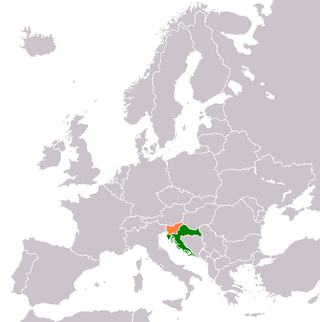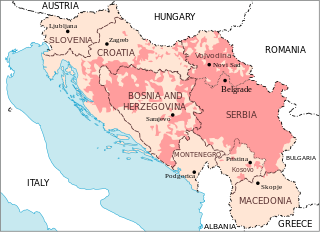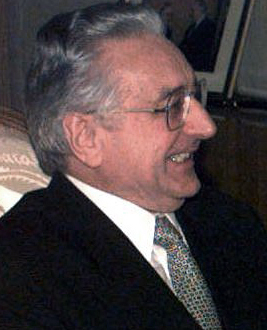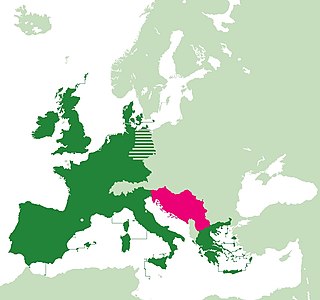
Yugoslavia was a country in Southeast and Central Europe that existed from 1918 to 1992. It came into existence following World War I, under the name of the Kingdom of Serbs, Croats and Slovenes from the merger of the Kingdom of Serbia with the provisional State of Slovenes, Croats and Serbs, and constituted the first union of South Slavic peoples as a sovereign state, following centuries of foreign rule over the region under the Ottoman Empire and the Habsburg monarchy. Peter I of Serbia was its first sovereign. The kingdom gained international recognition on 13 July 1922 at the Conference of Ambassadors in Paris. The official name of the state was changed to the Kingdom of Yugoslavia on 3 October 1929.

The Socialist Federal Republic of Yugoslavia, commonly referred to as Socialist Yugoslavia or simply Yugoslavia, was a country in Central and Southeast Europe. It was established in 1945 as the Federal People's Republic of Yugoslavia, following World War II, and lasted until 1992, breaking up as a consequence of the Yugoslav Wars. Spanning an area of 255,804 square kilometres (98,766 sq mi) in the Balkans, Yugoslavia was bordered by the Adriatic Sea and Italy to the west, Austria and Hungary to the north, Bulgaria and Romania to the east, and Albania and Greece to the south. It was a one-party socialist state and federation governed by the League of Communists of Yugoslavia, and had six constituent republics: Bosnia and Herzegovina, Croatia, Macedonia, Montenegro, Serbia, and Slovenia. Within Serbia was the Yugoslav capital city of Belgrade as well as two autonomous Yugoslav provinces: Kosovo and Vojvodina.

The Yugoslav Wars were a series of separate but related ethnic conflicts, wars of independence, and insurgencies that took place from 1991 to 2001 in what had been the Socialist Federal Republic of Yugoslavia. The conflicts both led up to and resulted from the breakup of Yugoslavia, which began in mid-1991, into six independent countries matching the six entities known as republics that had previously constituted Yugoslavia: Slovenia, Croatia, Bosnia and Herzegovina, Montenegro, Serbia, and Macedonia. SFR Yugoslavia's constituent republics declared independence due to unresolved tensions between ethnic minorities in the new countries, which fueled the wars. While most of the conflicts ended through peace accords that involved full international recognition of new states, they resulted in a massive number of deaths as well as severe economic damage to the region.

The Republic of Serbian Krajina or Serb Republic of Krajina, known as the Serbian Krajina or simply Krajina, was a self-proclaimed Serb proto-state, a territory within the newly independent Republic of Croatia, which it defied, and which was active during the Croatian War of Independence (1991–95). It was not recognized internationally. The name Krajina ("Frontier") was adopted from the historical Military Frontier of the Habsburg monarchy (Austria-Hungary), which had a substantial Serb population and existed up to the late 19th century. The RSK government waged a war for ethnic Serb independence from Croatia and unification with the Federal Republic of Yugoslavia and Republika Srpska.

After a period of political and economic crisis in the 1980s, the constituent republics of the Socialist Federal Republic of Yugoslavia split apart, but the unresolved issues caused a series of inter-ethnic Yugoslav Wars. The wars primarily affected Bosnia and Herzegovina, neighbouring parts of Croatia and, some years later, Kosovo.

The Croatian War of Independence was an armed conflict fought from 1991 to 1995 between Croat forces loyal to the Government of Croatia — which had declared independence from the Socialist Federal Republic of Yugoslavia (SFRY) — and the Serb-controlled Yugoslav People's Army (JNA) and local Serb forces, with the JNA ending its combat operations in Croatia by 1992.
Uti possidetis juris or uti possidetis iuris is a principle of international law which provides that newly formed sovereign states should retain the internal borders that their preceding dependent area had before their independence.
The Yugoslav Wars were a series of armed conflicts on the territory of the former Socialist Federal Republic of Yugoslavia (SFRY) that took place between 1991 and 2001. This article is a timeline of relevant events preceding, during, and after the wars.
Croatia held an independence referendum on 19 May 1991, following the Croatian parliamentary elections of 1990 and the rise of ethnic tensions that led to the breakup of Yugoslavia. With 83 percent turnout, voters approved the referendum, with 93 percent in favor of independence. Subsequently, Croatia declared independence and the dissolution of its association with Yugoslavia on 25 June 1991, but it introduced a three-month moratorium on the decision when urged to do so by the European Community and the Conference on Security and Cooperation in Europe through the Brioni Agreement. The war in Croatia escalated during the moratorium, and on 8 October 1991, the Croatian Parliament severed all remaining ties with Yugoslavia. In 1992, the countries of the European Economic Community granted Croatia diplomatic recognition and Croatia was admitted to the United Nations.
On 25 March 1991, the presidents of the Yugoslav federal states SR Croatia and SR Serbia, Franjo Tuđman and Slobodan Milošević, met at the Karađorđevo hunting ground in northwest Serbia. The publicized topic of their discussion was the ongoing Yugoslav crisis. Three days later all the presidents of the six Yugoslav republics met in Split. Although news of the meeting taking place was widely publicized in the Yugoslav media at the time, the meeting was overshadowed by the crisis in progress, that would lead to the breakup of Yugoslavia.

The Island of Vukovar is a disputed island on the river Danube. It is situated close to the city of Vukovar, Croatia.

The Presidency of the Socialist Federal Republic of Yugoslavia was the collective head of state of the Socialist Federal Republic of Yugoslavia. It was established in 1971 according to amendments to the 1963 Constitution and reorganized by the 1974 Constitution. Up to 1974, the Presidency had 23 members – three from each republic, two from each autonomous province and President Josip Broz Tito. In 1974 the Presidency was reduced to 9 members – one from each republic and autonomous province and, until 1988, President of the League of Communists of Yugoslavia ex officio.

Croatia and Germany established diplomatic relations on 15 January 1992. Croatia has an embassy in Berlin and five consulates general in Düsseldorf, Frankfurt, Hamburg, Munich and Stuttgart. Germany has an embassy in Zagreb and an honorary consulate in Split.

The foreign relations between Croatia and Slovenia are bound together by shared history, neighboring geography and common political ideologies. Both states established diplomatic relations in 1992, following the dissolution of Yugoslavia and the independence of Croatia. Modern relations are warm and friendly. The two states have disputes over their border and sovereign rights over certain nuclear and economic assets. The countries share 670 km (420 mi) of common border. They are perennially each other's largest trading partners on an import-export basis.
An independence referendum was held in Bosnia and Herzegovina between 29 February and 1 March 1992, following the first free elections of 1990 and the rise of ethnic tensions that eventually led to the breakup of Yugoslavia. Independence was strongly favored by Bosniak and Bosnian Croat voters while Bosnian Serbs boycotted the referendum or were prevented from participating by Bosnian Serb authorities.

From August 1990 to November 1991, during the breakup of Yugoslavia, several Serb Autonomous Regions, Districts were proclaimed in the Yugoslav republics of SR Croatia and SR Bosnia and Herzegovina in light of the possible secession of the republics from the Socialist Federal Republic of Yugoslavia. These were autonomous Serb-inhabited entities that subsequently united in their respective republic to form the Republic of Serbian Krajina in Croatia and the Republika Srpska in Bosnia and Herzegovina.

The independence of Croatia was a process started with the changes in the political system and the constitutional changes in 1990 that transformed the Socialist Republic of Croatia into the Republic of Croatia, which in turn proclaimed the Christmas Constitution, and held the 1991 Croatian independence referendum.

Democratic Federal Yugoslavia was a charter member of the United Nations from its establishment in 1945 as the Socialist Federal Republic of Yugoslavia until 1992 during the Yugoslav Wars. During its existence the country played a prominent role in the promotion of multilateralism and narrowing of the Cold War divisions in which various UN bodies were perceived as important vehicles. Yugoslavia was elected a non-permanent member of the United Nations Security Council on multiple occasions in periods between 1950 and 1951, 1956, 1972–1973, and 1988–1989, which was in total 7 years of Yugoslav membership in the organization. The country was also one of 17 original members of the Special Committee on Decolonization.

From the establishment of the European Economic Community in 1957 until the breakup of Yugoslavia in the early 1990s, thus during the Cold War period, the Socialist Federal Republic of Yugoslavia was the first socialist state to develop relations with the organisation. Notwithstanding occasional and informal proposals coming from both sides, Yugoslavia never became a full member state of the EEC.

The Agreement on Succession Issues of the Former Socialist Federal Republic of Yugoslavia is an international agreement on shared state succession of the Socialist Federal Republic of Yugoslavia reached among its former constituents republics following the breakup of the country in early 1990s.
















